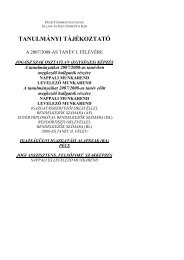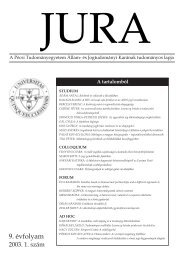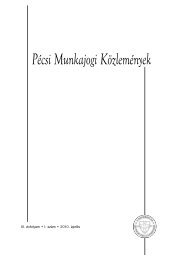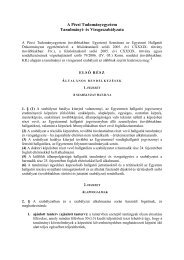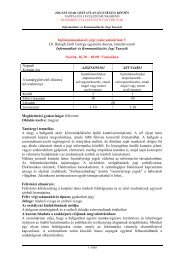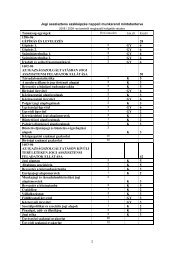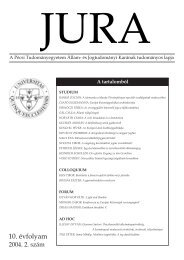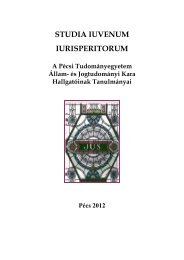2012. évi 2. szám - Jura - Pécsi Tudományegyetem
2012. évi 2. szám - Jura - Pécsi Tudományegyetem
2012. évi 2. szám - Jura - Pécsi Tudományegyetem
- TAGS
- jura
You also want an ePaper? Increase the reach of your titles
YUMPU automatically turns print PDFs into web optimized ePapers that Google loves.
Andityas Soares de Moura Costa Matos: An alternative approach to the basic norm …143of the first legislator – and thus on all other acts ofthe legal system resting on this first act – the senseof ‘ought’ (Sollen), that specific sense in which legalcondition is linked with legal consequence in the [..]legal norm”( Kelsen 1992, 58).Let us analyze another important similarity betweenKant and Kelsen: just like the former wonderedhow an interpretation of the natural sciences could bepossible without the metaphysics, Kelsen wonderedhow law could be thought without the metalegalauthorities (Kelsen 1997, 223). To answer this question,Kelsen is led to abandon his purely descriptiveand creative claims in order to create – epistemologicallyspeaking (Roy 1997, 6) – an assumed normativeinstance that is unfolded as a logical-transcendentalhypothesis. Thus, it is a presupposed norm – it cannotbe established, since it would depend on an act ofpower which, in turn, would have to be redirected toa superior act of power and, therefore, infinitely – bythe legal thought, necessary if someone wants to givescientific interpretations to the study object of LegalScience. No doubt, however, that this structure givesrise to a central tension in the doctrine of Kelsen, sincea purely descriptive norm – “scientific” – as the basicnorm ends up being called to give validity to realnorms, i.e., prescriptive (Roy 1997, 14). To overcomethis tension only seems possible when we recognizetwo conditions for the assumption of the basic norm,which is not arbitrarily imagined as alleged by somecritics to the Pure Theory of Law.3.<strong>2.</strong>3 Conditions for the assumption of the basicnormThe first condition, which is of epistemological nature,determines that the basic norm is a hypothesis,that is, it behaves according to a non-axiomatic logic,very common to Kant’s hypothetical judgments. 8Thus, if – and only if – we intend to build scientificinterpretations of the law, we must assume a basicnorm that avoids the regressum ad infinitum andthe appeal to meta-legal authorities. As we know,a hypothesis is embodied in a proposition that isaccepted regardless of whether it is true or false. Instead,it is about grounding a principle from whichwe can deduce a certain set of consequences. Moreimportantly: the basic norm, understood in hypotheticalterms, can be (although it does not have tobe) assumed (Kelsen 1986, 328). Concerning to thisepistemological condition, the act of assuming thebasic norm only has a real meaning if one intendsto describe the law in a scientific way, 9 disregardingthe existence of transcendent authority, such asGod or the very nature of things, which are materialbasis of validity according to the adepts of thenatural law.From this perspective, it does not seem correctto define the basic norm as an improvable “articleof faith” that only allows a pedigree test capable ofgiving legal character – that is, of an objective ought– to other norms of the system through chains ofassignment of competence, as proposed by Honoré(Honoré 2007, 101). According to this author, theissue of Kelsen’s basic norm would turn on a credoquia incredibile (Honoré 2007, 110). In fact, nothingcould be more false than this. There is no absolute ormetaphysical necessity that determines the assumptionof the basic norm. If we want to describe thelaw in a scientific way, surely we must presupposeit. In other circumstances this is not necessary, as inthe case of an anarchist who sees legal norm as mereformalizations of power relations. He is not obligedto assume any basic norm because it represents onlya possible, rather than a necessary, scheme of interpretation(Kelsen 1942, 329).We should also add that the discussion about thebasic norm is meaningless if one is trying to provethat it is an assumption. From the logical point ofview, something cannot be “an assumption”, sincethe terms “established” and “assumption” refer tothe nature of the norms, i.e., to the way that they areshowed, reflecting one quality and not the being – orthe essence, in scholastic language – of a particularentity. However, with regards to the basic norm,its being is revealed as a logical-transcendental hypothesis.According to Raz, this means that the basicnorm is not created as the other system norms, butassumed. Moreover, it is not an arbitrary product ofpositivist imagination. The basic norm is not inventedbut discovered (Honoré 2007, 93). It does not comefrom other norms or from the recognition of the dutyto fulfil the established law. It is not possible to askourselves when, by whom and how the basic normwas “created”. These categories simply do not applyto the Grundnorm (Raz 2007, 50-51).Thus, while characterizing the basic norm as anassumed hypothesis, rather than a established norm,Kelsen easily got rid of the criticisms of Amselekand Niort, for whom the basic norm is merely atautology (Amselek 1978; 1981; Niort 1993). Theseauthors question how the basic norm can be presupposedto validate the legal order if we can onlygive legal status to one or another normative orderafter the assumption of a basic norm. This wouldmean that we obey the law because it is law (Roy1997, 12) or, as Niort would say, we consider thelegal norms mandatory because we assume that weshould generally obey the law (Niort 1993, 179). Thisdifficulty is overcome by the assumed character ofthe basic norm, which, before giving validity to thelegal system – before, in Raz’s language, “confer-JURA 2012/<strong>2.</strong>



